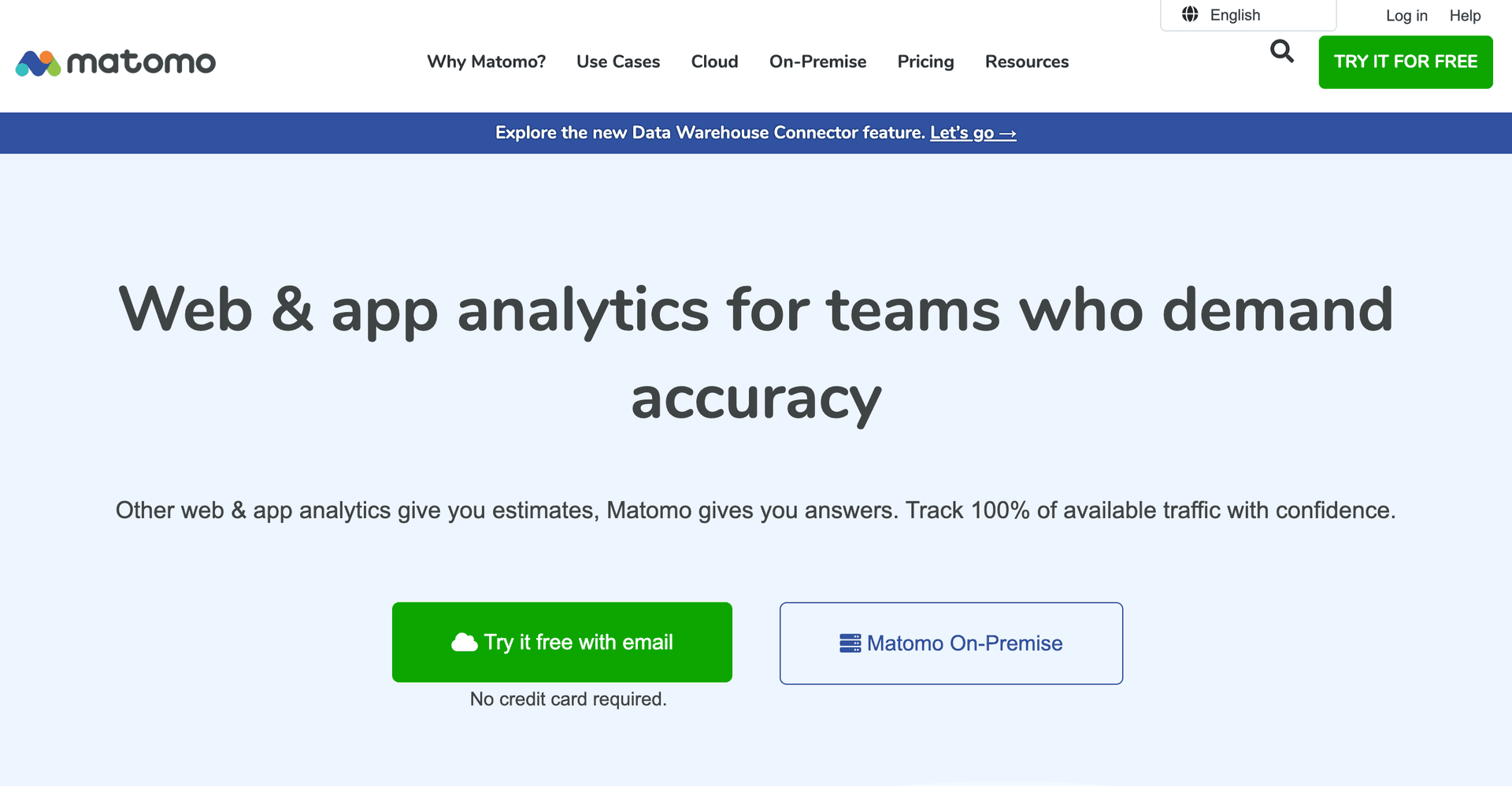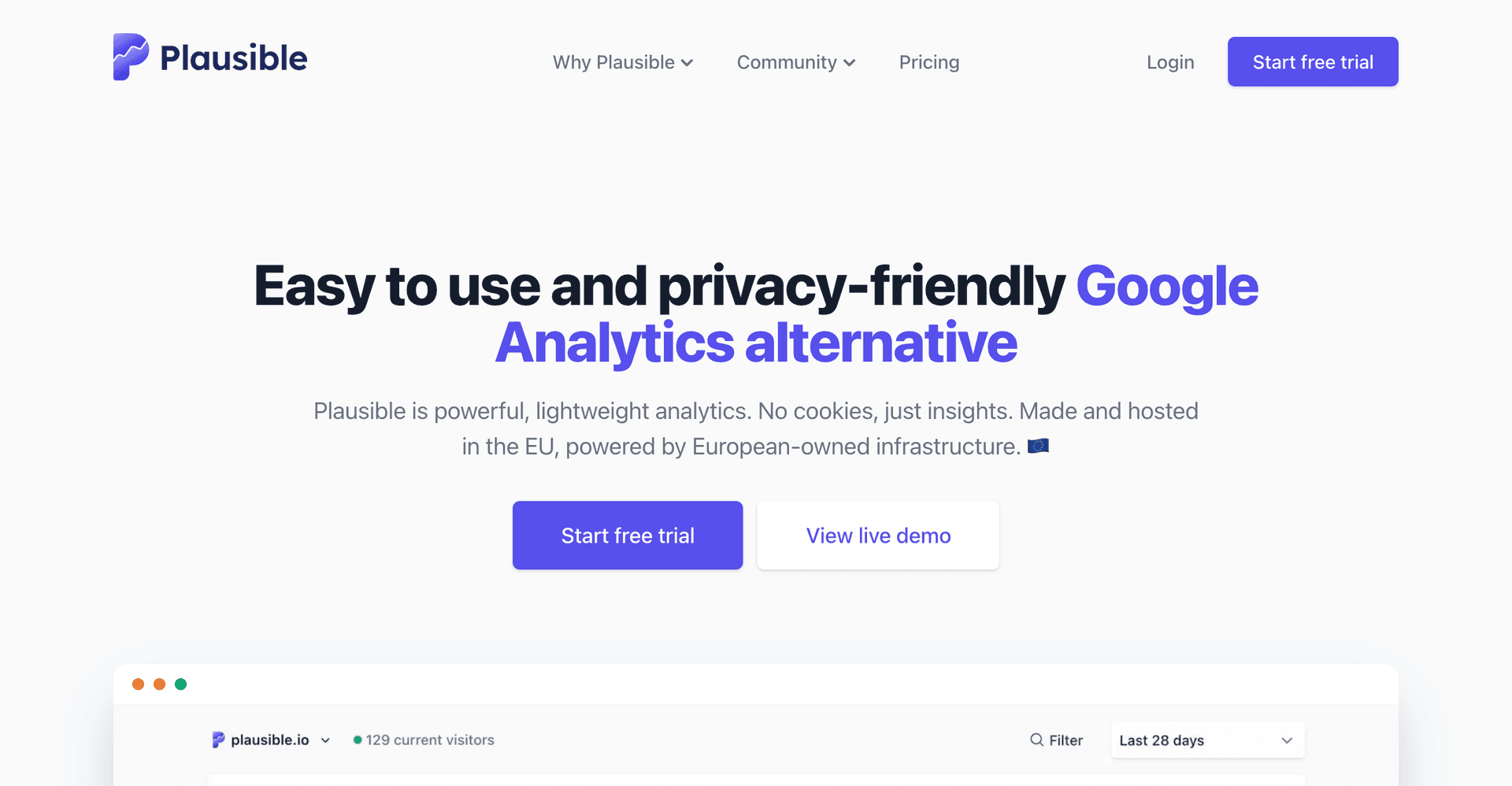15 Best Google Analytics Alternatives in 2026
Google Analytics (GA) has been the industry standard for years, but it’s not the best fit for everyone. GA4 brought a new data model and complex setup, which has left many marketers and businesses searching for something easier, more privacy-focused, or more tailored to their needs.
Whether you’re running a SaaS business, an eCommerce store, or a content site, there are plenty of Google Analytics alternatives that might be a better fit. Some are lightweight and privacy-first, others are full-featured platforms with product analytics, heatmaps, or session recordings.
We’ve reviewed the top options to help you choose the right tool.
1. Userbird
Best for: Marketers who want all-in-one analytics with heatmaps, session recordings, and conversion tracking
Userbird is a modern analytics platform built for marketers rather than engineers. It combines traditional web analytics with heatmaps, session recordings, and AI-powered event tracking, so you can see both the numbers and the “why” behind user behavior.
Userbird Analytics
Userbird is a powerful Google Analytics alternative with session replay, heatmaps, Stripe & Google Search Console integration and more.
Unlike GA4, where you need to set up every event manually, Userbird automatically detects key interactions and conversions. That makes it especially useful for teams that don’t want to spend hours configuring reports.
Key features:
- Automatic event and conversion tracking
- Heatmaps and session recordings
- Funnels and conversion attribution
- GDPR-compliant, cookieless options
- Marketer-friendly dashboards with clear insights
Pricing: Starts from $19/month for 10,000 monthly tracked users
Why choose Userbird: If you want an easy, all-in-one replacement for Google Analytics that goes deeper with user behavior, Userbird is the standout choice.
2. Matomo
Best for: Organizations that need full control of their data
Matomo is the best-known open-source alternative to GA. It offers the same kind of traffic analysis but gives you the option to self-host your data for complete ownership and compliance. This makes it a strong choice for governments, enterprises, and anyone working in regulated industries.

Key features:
- Self-hosted or cloud-hosted
- GDPR-compliant with data residency controls
- Custom dashboards and segmentation
- Plugins for eCommerce and advanced tracking
Pricing: Free if self-hosted, or from ~$23/month for the hosted version
Why choose Matomo: Go with Matomo if you need GA-style analytics but want to own 100% of your data.
3. Plausible
Best for: Simple, privacy-first analytics
Plausible is a lightweight analytics platform designed to be simple, fast, and cookie-free. It strips away unnecessary complexity and shows you only the most important website metrics. Its script is under 1 KB, which makes it appealing to developers who care about page speed.

Key features:
- No cookies, no personal data collection
- Lightweight tracking script
- Clean, simple reports
- Open source and transparent
Pricing: From $9/month
Why choose Plausible: Perfect if you want privacy-first analytics that load instantly and are easy to understand.
4. Fathom Analytics
Best for: Privacy-focused businesses that want simple dashboards
Fathom Analytics is another privacy-friendly analytics tool with a clean interface. It’s built to be an easy, compliant replacement for GA, especially for small to medium-sized businesses.
Key features:
- GDPR, CCPA, and PECR compliant
- Fast, simple reports
- Server-side event tracking
- Unlimited sites and dashboards
Pricing: From $14/month
Why choose Fathom: Great if you want simple analytics and peace of mind about data compliance.
5. PostHog
Best for: SaaS and product teams
PostHog is an open-source product analytics suite. It goes beyond pageviews and helps you track events, funnels, and retention. It also includes feature flags, A/B testing, and session recordings.
Key features:
- Event-based analytics
- Cohort and funnel analysis
- Session recordings
- Feature flags and experimentation
Pricing: Free plan available; paid from ~$25/month
Why choose PostHog: A solid option for SaaS teams that want to combine analytics with experimentation.
6. Mixpanel
Best for: Funnel and cohort analysis
Mixpanel is one of the most established product analytics platforms. It focuses on helping teams understand how users move through funnels and which actions drive retention.
Key features:
- Event-based data model
- Cohort analysis
- Funnel and retention reports
- Real-time segmentation
Pricing: Free up to 20M events per month, then custom pricing
Why choose Mixpanel: Ideal for teams that need detailed funnel and retention insights.
7. Amplitude
Best for: Enterprise-level product analytics
Amplitude is a leader in product analytics for large organizations. It offers powerful cohort analysis, segmentation, and predictive analytics, often integrated into broader growth and data strategies.
Key features:
- Deep event and cohort analysis
- Predictive insights
- Behavioral segmentation
- Integrations with BI and data warehouses
Pricing: Free plan available; enterprise pricing on request
Why choose Amplitude: Best for enterprises that need advanced analytics at scale.
8. Heap
Best for: Teams that don’t want to manually tag events
Heap captures every click, tap, and form submission automatically. You can retroactively analyze data, which makes it easier to explore user journeys without worrying about missing something.
Key features:
- Automatic event capture
- Journey and funnel analysis
- Retroactive event tracking
- Strong integrations
Pricing: Free plan available; custom pricing for larger plans
Why choose Heap: If you don’t want to spend time configuring events, Heap’s automatic capture is a huge time saver.
9. Clicky
Best for: Real-time traffic monitoring
Clicky is a simple analytics platform that focuses on real-time data. It’s been around for years and remains popular with smaller sites that value straightforward reporting.
Key features:
- Real-time visitor tracking
- Heatmaps
- Goal tracking
- Simple reports
Pricing: Free basic plan; Pro from $9.99/month
Why choose Clicky: A reliable, budget-friendly option for smaller sites that want real-time analytics.
10. Simple Analytics
Best for: Basic, privacy-focused analytics
Simple Analytics lives up to its name. It’s a cookie-free platform that presents website stats in an easy-to-read format. It’s especially popular in Europe for GDPR compliance.
Key features:
- No cookies or personal data
- Clear, simple dashboards
- Fast setup
- API for developers
Pricing: From €9/month
Why choose Simple Analytics: A strong option if you want to stay GDPR-compliant and keep things minimal.
11. Yandex Metrica
Best for: Free analytics with extra behavior tools
Yandex Metrica is a free alternative that offers more than basic analytics. It includes heatmaps and session recordings, making it more versatile than GA in some areas.
Key features:
- Free to use
- Heatmaps
- Session recordings
- Funnel and form analysis
Pricing: Free
Why choose Yandex Metrica: If you want a free solution with behavior analytics built in.
12. Statcounter
Best for: Small businesses that want basic stats
Statcounter is one of the oldest analytics tools. It’s lightweight and easy to use, though not as feature-rich as newer competitors.
Key features:
- Visitor path tracking
- Email reports
- Basic goal tracking
Pricing: Free up to 500 logs; paid from $9/month
Why choose Statcounter: Good for small businesses that just want straightforward traffic stats.
13. Woopra
Best for: Customer journey analytics
Woopra focuses on tracking the entire customer journey, connecting marketing, sales, and support data into one view.
Key features:
- Real-time analytics
- Customer journey mapping
- CRM and marketing integrations
- Retention analysis
Pricing: Free tier; paid plans from $79/month
Why choose Woopra: If you want to analyze customer journeys across multiple touchpoints.
14. Kissmetrics
Best for: eCommerce and SaaS businesses
Kissmetrics is designed for businesses that want to track revenue and retention alongside engagement metrics. It’s especially useful for subscription and eCommerce businesses.
Key features:
- Cohort and funnel reports
- Revenue tracking
- Customer segmentation
Pricing: From $299/month
Why choose Kissmetrics: Choose it if you want analytics focused on revenue and lifetime value.
15. Hotjar
Best for: Behavior analytics and feedback
Hotjar isn’t a direct GA alternative but complements analytics with user behavior insights. It’s best used alongside another analytics tool.
Key features:
- Heatmaps
- Session recordings
- Feedback surveys
- On-site polls
Pricing: Free tier; paid plans from $39/month
Why choose Hotjar: Perfect for understanding why users behave the way they do.
Comparison Table: Best Google Analytics Alternatives in 2026
| Tool | Best For | Key Features | Pricing |
|---|---|---|---|
| Userbird | All-in-one analytics with heatmaps and conversion tracking | Automatic event tracking, heatmaps, session recordings, funnels, GDPR compliant | From $19/month |
| Matomo | Data ownership and self-hosting | Open-source, self-hosted or cloud, GDPR-friendly, eCommerce plugins | Free (self-hosted) or from ~$23/month |
| Plausible | Simple, privacy-first analytics | Lightweight script, cookie-free, open source, easy reporting | From $9/month |
| Fathom Analytics | Privacy-focused SMBs | GDPR/CCPA/PECR compliant, server-side tracking, unlimited dashboards | From $14/month |
| PostHog | SaaS product analytics | Event-based tracking, funnels, feature flags, session recordings | Free tier; paid from ~$25/month |
| Mixpanel | Funnel and retention analysis | Cohort analysis, event-based data, real-time segmentation | Free up to 20M events; custom after |
| Amplitude | Enterprise product analytics | Predictive insights, segmentation, behavioral cohorts, BI integrations | Free plan; enterprise pricing on request |
| Heap | Automatic event capture | Retroactive analysis, journey mapping, auto-event capture | Free tier; custom pricing |
| Clicky | Real-time web analytics | Real-time visitors, heatmaps, goal tracking | Free basic; Pro from $9.99/month |
| Simple Analytics | Minimal, GDPR-friendly analytics | Cookie-free, simple dashboards, fast setup, API access | From €9/month |
| Yandex Metrica | Free analytics with behavior tools | Heatmaps, session recordings, funnel analysis | Free |
| Statcounter | Small business web stats | Visitor paths, email reports, basic goals | Free up to 500 logs; paid from $9/month |
| Woopra | Customer journey analytics | Real-time analytics, CRM integrations, retention tracking | Free tier; paid from $79/month |
| Kissmetrics | eCommerce and SaaS metrics | Cohort reports, revenue tracking, customer segmentation | From $299/month |
| Hotjar | Behavior analytics and feedback | Heatmaps, session recordings, surveys, polls | Free tier; paid from $39/month |
Final Thoughts
Google Analytics remains the default, but it’s no longer the only serious choice. Depending on your needs, you can pick:
- Privacy-first alternatives: Plausible, Fathom, Simple Analytics
- Product analytics platforms: Mixpanel, Amplitude, PostHog, Heap
- All-in-one behavior and analytics suites: Userbird, Hotjar, Yandex Metrica
👉 If you want an easy, powerful, and marketer-friendly alternative, start with Userbird.

